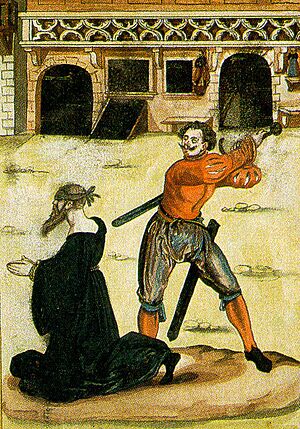Johann Sylvan facts for kids
Johann Sylvan was a German theologian who lived in the 1500s. He was part of the Reformed Christian faith. Sadly, he was executed on December 23, 1572. This happened because he held beliefs that were considered heretical at the time. Specifically, he did not believe in the Trinity, a core Christian idea.
Contents
Early Life and Career
Johann Sylvan likely came from the Etsch valley, a region in Tyrol. By 1555, he was working as a preacher for the bishop of Würzburg. A few years later, in 1559, he left Würzburg. He then joined the Lutheran church in Tübingen. In 1560, Sylvan became a minister in the town of Calw.
Working for the Reformed Church
In 1563, Johann Sylvan began working for the Reformed church. He served Frederick III, who was the Elector of the Electorate of the Palatinate. An Elector was a powerful ruler in the Holy Roman Empire.
In the same year, Sylvan became a pastor in Kaiserslautern. He also became a church superintendent there. This meant he oversaw other churches in the area. In 1566, Sylvan went on a special trip to the Netherlands to help with diplomatic matters.
A year later, in 1567, Sylvan became a pastor in Ladenburg. Around 1568, there was a big debate in the Palatinate. It was about how churches should be run and disciplined. Sylvan, along with his friends Thomas Erastus and Adam Neuser, became leaders of a group that disagreed with strict Calvinist rules.
His Beliefs About God
Johann Sylvan was asked to write against the ideas of an Italian thinker named Giorgio Biandrata. Biandrata held beliefs that were called Antitrinitarian. This meant he did not believe in the Christian idea of the Trinity, which says God is one being in three persons (Father, Son, and Holy Spirit).
However, as Sylvan tried to argue against Biandrata, he started to agree with him instead. He found Biandrata's arguments convincing. A famous Hebrew scholar, Immanuel Tremellius, could not find support for the Trinity in the Old Testament. This made Sylvan even more sure of his new beliefs.
Sylvan joined a small group of people who shared these Antitrinitarian views. This group included Adam Neuser, Matthias Vehe-Glirius, Jakob Suter, and Johann Hasler. In 1570, Johann Sylvan wrote a book explaining his beliefs. It was called True Christian Confession of the Ancient Faith of the One True God and of Messiah Jesus of the True Christ, against the Three-Person Idol and the Two-Natured False Deity of the Antichrist.
Arrest and Execution
Sylvan and Adam Neuser tried to move to Transylvania. They wrote a letter to the prince of Transylvania. But their letter was discovered. Johann Sylvan was arrested because, unlike Neuser, he could not escape.
Even though Sylvan later said he no longer believed in the Unitarian faith (another name for Antitrinitarianism), he was still found guilty. He was then beheaded in the marketplace of Heidelberg. This happened on December 23, 1572.
Elector Frederick III, Sylvan's ruler, was in a difficult position. His own Reformed faith was not fully accepted by everyone at the time. To show that his state was still following accepted religious rules, the court felt it had to execute Sylvan. This was to prove their loyalty to the main Christian beliefs.
 | James Van Der Zee |
 | Alma Thomas |
 | Ellis Wilson |
 | Margaret Taylor-Burroughs |


